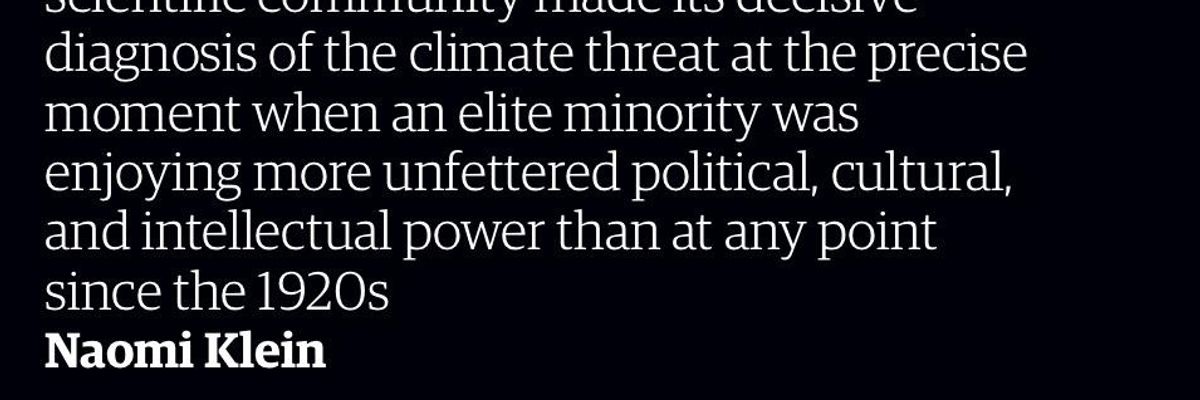CD editor's note: What follows is a portion of the second excerpt published in the Guardian this week of Naomi Klein's best-selling book, This Changes Everything: Capitalism vs. the Climate. Read the first selected excerpt here.
The alarm bells of the climate crisis have been ringing in our ears for years and are getting louder all the time - yet humanity has failed to change course. What is wrong with us?
Many answers to that question have been offered, ranging from the extreme difficulty of getting all the governments in the world to agree on anything, to an absence of real technological solutions, to something deep in our human nature that keeps us from acting in the face of seemingly remote threats, to - more recently - the claim that we have blown it anyway and there is no point in even trying to do much more than enjoy the scenery on the way down.
Some of these explanations are valid, but all are ultimately inadequate. Take the claim that it's just too hard for so many countries to agree on a course of action. It is hard. But many times in the past, the United Nations has helped governments to come together to tackle tough cross-border challenges, from ozone depletion to nuclear proliferation. The deals produced weren't perfect, but they represented real progress. Moreover, during the same years that our governments failed to enact a tough and binding legal architecture requiring emission reductions, supposedly because cooperation was too complex, they managed to create the World Trade Organisation - an intricate global system that regulates the flow of goods and services around the planet, under which the rules are clear and violations are harshly penalised.
The assertion that we have been held back by a lack of technological solutions is no more compelling. Power from renewable sources like wind and water predates the use of fossil fuels and is becoming cheaper, more efficient, and easier to store every year. The past two decades have seen an explosion of ingenious zero-waste design, as well as green urban planning. Not only do we have the technical tools to get off fossil fuels, we also have no end of small pockets where these low carbon lifestyles have been tested with tremendous success. And yet the kind of large-scale transition that would give us a collective chance of averting catastrophe eludes us.
Is it just human nature that holds us back then? In fact we humans have shown ourselves willing to collectively sacrifice in the face of threats many times, most famously in the embrace of rationing, victory gardens, and victory bonds during world wars one and two. Indeed to support fuel conservation during world war two, pleasure driving was virtually eliminated in the UK, and between 1938 and 1944, use of public transit went up by 87% in the US and by 95% in Canada. Twenty million US households - representing three fifths of the population - were growing victory gardens in 1943, and their yields accounted for 42% of the fresh vegetables consumed that year. Interestingly, all of these activities together dramatically reduce carbon emissions.
Read the rest of this excerpt at The Guardian.

